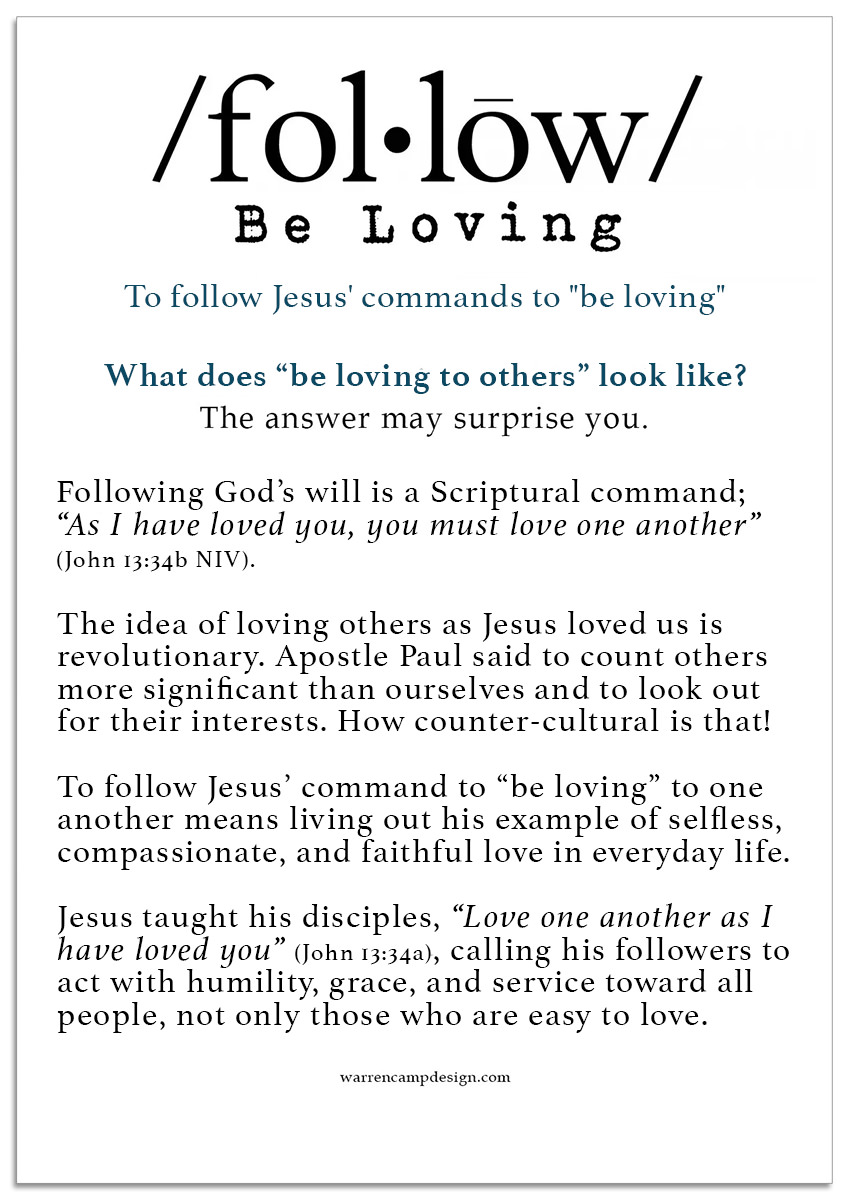Apostle John’s Three Letters . . . 1 John 4:16b–21
John Highlights the Motif of Love
Our short passage teaches that genuine love originates in God, who himself is love, and that our capacity to love others flows directly from our relationship with him. When we live in God’s love, fear is replaced by confidence — especially the fear of judgment — because perfect love casts out fear. John emphasizes that love for God cannot be separated from love for people: Anyone who claims to love God while hating a brother or sister is self-deceived. True love for God is demonstrated in how we treat others, for the command we have received is inseparable and absolute — “Whoever loves God must also love his brother and sister” (4:21).
However, Satan continually attempts to shake our assurance of salvation. John informed his initial readers that false teachers were spreading heresy among the house churches in Ephesus, leaving them to form new churches and encouraging many church-body members to question whether what they’d been taught was true. Apostle John, therefore, wrote this letter to his dear children so that he’d effectively assure them that they were certainly living in a God-honoring fellowship with Christ.
John’s two-part statement (v. 12) about God abiding in us and his love being perfected in us, is an apt segue into 4:16–21. Today's study will reveal how John discusses the important element of having an abiding relationship (vv. 13–16) and then talks about God’s love being perfected in us (vv. 17–21).
Our God Is a God of Love (1 John 4:16b)
Today’s short passage focuses on these two essential truths: (1) Loving our brethren is evidence that we Christians abide in God as he lives in us; (2) God is the “standard” for love, in that his actions reveal to us what love is and how it manifests itself. What John is saying to us begins with this revelation:
God is love. Whoever lives in love lives in God, and God in them (4:16b).
Aren’t we happy that our God is the God of love? We can know that we truly believe in Christ because the Holy Spirit of love lives in us. And, as we live in God and his love, he lives in us. But if we disobey his commands and his word, we don’t live in his love and he doesn’t live in us. The only way to love is by living in God. Such divine indwelling facilitates both belief and love. Without the Holy Spirit, we’re bound to find ourselves struggling in darkness while there’s a chill in our hearts. Only the Holy Spirit can illuminate our minds to fully believe in Jesus while warming our hearts sufficiently to enable us to love God and one another.
When John writes “God is love,” he’s not saying that love is simply a gift from God, or that love is an attribute of God. He’s making the point that God, in his essence, is love; it’s his nature! And when we look at the Triune God, God the Father is love, God the Son is love, and God the Holy Spirit is love. For that reason, John intimates that, if you know God the Father, and you know God the Son, and you know God the Holy Spirit, and you’re in fellowship with them, you will love your brother and sister in Christ.
I Howard Marshall says this about “Whoever lives in love lives in God.”
Verse 16b’s two “lives in” (Greek menō en) verb phrases relate to “abiding,” “continuing,” “remaining,” “residing.” Menō en describes something that remains where it is, continues in a fixed state, or endures. Here, its translation indicates a close, intimate, permanent relationship between the believer and God. The repeated phrase therefore suggests all of the following: a permanence of position, occupying a place as one’s dwelling place; holding and maintaining unbroken communion; and fellowship with another.
Confidence on Judgment Day (vv. 17–18)
17This is how love is made complete among us so that we will have confidence on the day of judgment: In this world we are like Jesus. 18There is no fear in love. But perfect love drives out fear, because fear has to do with punishment. The one who fears is not made perfect in love (4:17–18).
Thankfully, we can have boldness and confidence on our last day, judgment day, because our love is “complete among us.” The Greek word for boldness and/or confidence is parresia (as in 2:28, and 3:21–22). It originally meant “freedom of speech” but has transitioned to mean “a bold assurance or unshrinking confidence” as we approach God.
Here, the Greek teleioo for “perfect” means “has been made perfect or complete, and exists in its finished results.” This “perfection” embodies two components: (1) a believer’s past occurrence or fact and (2) a present reality in a believer’s life. Charles Spurgeon (English Baptist preacher, 1834–1892) said this about our “complete love” and “confidence on judgment day” (v. 17): “If we can be to the world, in our poor feeble measure, what God is to it — fountains of love, dispensaries of goodness — then we need not be afraid of the verdict, even of the great day of judgment.”
Pastor/Commentator Steve Cole says this in his commentary about v. 17: “God’s love through us to others gives confidence in the day of judgment because it shows that we are like Jesus. John adds, ‘In this world we are like Jesus.’” And John Piper expounds in (Perfect Love Casts Out Fear): “The assumption is that at the judgment day, God won’t condemn people who are like his Son. Living a life of active love shows that we have the Spirit of Jesus. It shows we belong to the family of God. And that gives us confidence before God. You can’t live at odds with the character of Jesus and then expect to have any confidence when you stand before his Father at the final judgment.”
It’s by our effort to love, as God’’s obedient children, that we exemplify our loving Father, God. There’s no fear in remaining in such a close familial fellowship. The sins of a faithful Christian have already been judged by Jesus on the cross; they’ll never ever be remembered! Add to that the fact that the Bible assures us, having been justified by faith (Ephesians 2:8–9), we now have peace with God through Christ Jesus (Romans 5:1). The cure for fear and torment is to: “Love the Lord with all our heart and with all our soul and with all our mind and with all our strength” (Mark 12:30). When our love of God is complete, there’ll be no room for fear or agony. May we remember always that there’s no fear when love is perfected (v. 18). Oswald Chambers adds these penetrating words about “fearing God.”
Putting John’s “love” theme in context, he states in 4:12: “… if we love one another, God lives in us and his love is made complete in us.” His follow-up in vv. 13–16 amplifies the element of divine indwelling. Here in vv. 17–21, he returns to the theme of “complete love,” however, he’s now attentive to distinguishing between and comparing the aspect of God’s love in us and our love for God. He characterizes two signs of “perfect love”: (1) our confidence before God and (2) our love of our brothers and sisters. Believers are to follow God’s commands throughout Scripture and be loving to one another.
Note: John isn't declaring that “perfect love” comes without faults and weakness; instead, it presents a maturation that leads to a fulfillment of proposed goodness.
At one point in life, all of us should have experienced the fear of God’s judgment. But as we grow in decency and godliness, that alarm gets replaced by God’s love. Thankfully for us believers, John alerts us to the possibility for us to easily become filled with pride, allowing us to become dishonest or make lame excuses regarding the practicality of loving others. In vv. 19–21, he designates such obstacles to avoid.
When Claims Lead to Commands (vv. 19–21)
19We love because he first loved us. 20Whoever claims to love God yet hates a brother or sister is a liar. For whoever does not love their brother and sister, whom they have seen, cannot love God, whom they have not seen. 21And he has given us this command: Anyone who loves God must also love their brother and sister (4:19–21).
This passage’s short opening verse not only tells us why we love Jesus but how we can love him more. John’s “he first loved us” means that it’s true that God loves us now. Do you truly believe that? “Oh, if you do really believe that he has loved you so, sit down, and turn the subject over in your mind, and say to yourself, ‘Jesus loves me; Jesus chose me; Jesus redeemed me; Jesus called me; Jesus has pardoned me; Jesus has taken me into union with himself’” (Spurgeon).
Realize this: To know that we’re forgiven for our sin, loved in our weakness, saved by his mercy, bound to have personal, meaningful, life-sustaining fellowship with God,… all because we’re supremely valued by him, that’s what it takes to enable us to know assuredly that perfect love drives away distress and fearfulness. We can have such confidence before God, not because of what we’ve done but what God — the true and ultimate source of love — has done for us. So, because God’s love empowers us to love, no one can claim to love God while hating a fellow Christian (v. 20). Loving God, without loving others, is unimaginable because “God is love.”
Verse 20 serves as a powerful spiritual “reality check,” reminding us that our relationship with the Divine is mirrored directly in how we treat the people standing right in front of us. It suggests that love isn’t merely an abstract feeling directed toward the heavens, but a practical, visible discipline that must be practiced on Earth to be considered authentic.
For sinners, it would be impossible to know and love God. Fortunately, he chose to show us (his confessing sinners) his love by sending us his one true Son, Jesus. Having done so, our Lord Jesus revealed the Father’s love of us by choosing to die on a cruel cross on our behalf. The cross removes all doubt about whether God does or doesn’t love us. Seeing and appreciating God’s great sacrificial love, we’re bound and obliged to love him back. We also ought to remember what John reminded us in 3:16–17 and 4:11: We’re to not only love God but love our believing brothers and sisters.
There’s no getting around it: If any of us says that he loves God while at the same time hating his brother, sister, or neighbor, he becomes a deceiver, a false witness (v. 20). Remember: It was to refute such false witnesses that Apostle John wrote his first epistle. And as you reread this two-verse passage, it’s important to make the distinction between divine love and the love of man. According to Dr. James Boice, “These verses are the equivalent of saying that a person cannot practice agape-love unless he can first practice philia-love.”
If a man professes to love God, and yet indulges anger or revenge or shows a selfish disposition, he gives to his proclamation a lie. But if it’s plain that our natural resentment of others gets miraculously converted into affection and gratitude, we shouldn’t hesitate to bless God’s name for this blessing of eternal happiness. When we succeed at loving God and all our brethren, we distinguish ourselves from the false teachers of John's day who pretended to love God, whom they’d never seen, while they hated fellow church-body members whom they’d seen.
In conclusion The source of divine love is God. And God is love. The undeniable mark of divine love is how and what Christ had sacrificed for us on the cross. In chapter 4’s closing verse, John the Elder repeats his references to God’s love command, driving home the essence of “divine love” and “brotherly love.” How can we not take God earnestly when he’s given us such clear commandments on how to live and love?
- Q. 1 How does the perfection of a Christian’s love give him or her boldness on Judgment day?
- Q. 2 How is “perfect love” able to cast out fear?
1 John 4:16b–21
New International Version (NIV)
[View it in a different version by clicking here; also listen to chapter 4 narrated by Max McLean.]





